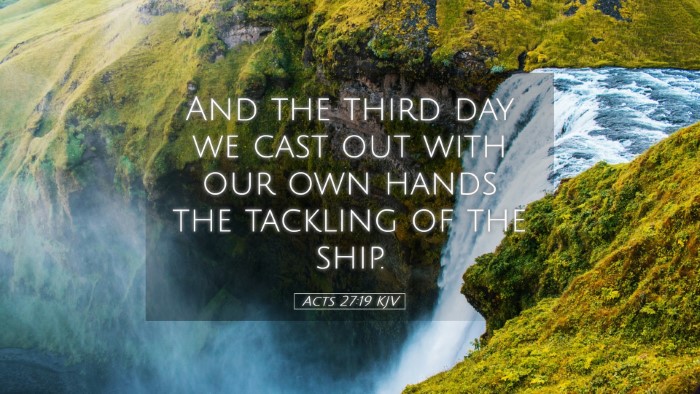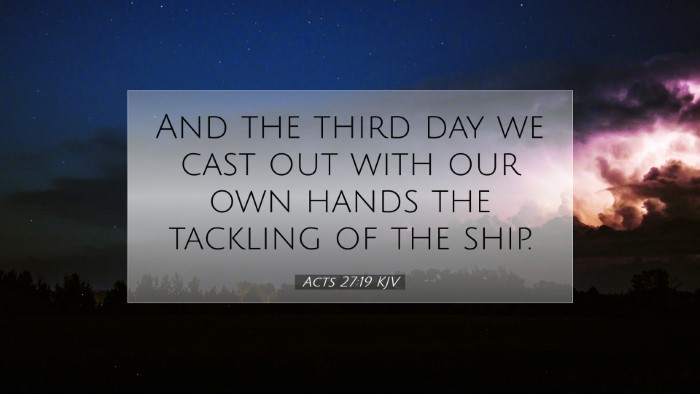Commentary on Acts 27:19
Acts 27:19 states: "And the third day we cast out with our own hands the tackling of the ship." This verse is a crucial moment in the narrative of Paul’s voyage to Rome, depicting a scenario of desperation and the severity of the voyage’s conditions. Below is a concise commentary integrating insights from public domain commentaries.
Contextual Overview
This event takes place amidst a perilous maritime journey where Paul is a prisoner, sailing towards Rome. The ship encountered a grave tempest, commonly referred to as "Euroclydon," which threatened both cargo and crew. This voyage underscores the theme of divine providence and the steadfastness of faith amidst adversity.
Analysis of the Verse
In Acts 27:19, the phrase "the third day" is significant, indicating a timeframe wherein the crew's hope for safety is waning. The act of casting out "the tackling of the ship" symbolizes not only a physical action but also reflects a spiritual and emotional state. Their actions are indicative of despair, as they resort to drastic measures to lighten the ship's load in a last-ditch effort to stave off disaster.
Insights from Matthew Henry
Henry emphasizes the weight of the sailors' actions. He notes that "when we find ourselves in distress, we should question what we hold tightly and consider what we may need to relinquish." The tackling of the ship represents worldly attachments and the necessity of surrendering them for survival. Matthew Henry also highlights the indicative nature of the "third day," noting that it symbolizes delayed hope and the need for deliverance. The sailors’ desperation echoes the human experience of grappling with crises, inviting readers to reflect on their own lives.
Insights from Albert Barnes
Barnes provides a practical interpretation, suggesting that the tackling—essentially the ship's gear—was essential for maneuverability. His commentary reveals that in moments of peril, what we may consider necessary can become burdens. He underscores that true reliance on God often leads to a renunciation of this worldly security. His focus on their actions invites discussions on faith against troubling circumstances, reminding us of the principle that trusting God does not negate the need for practical action in crisis situations.
Insights from Adam Clarke
Clarke's commentary delves deeper into the dire situation aboard the ship. He interprets "the tackling" as not merely the physical gear but as symbolic of reliance on one's own means of salvation. Clarke points out that the situation compels all involved to recognize the limitations of human effort. He emphasizes faith in divine intervention, observing that their efforts, however desolate, are not in vain when aligned with God’s purposes—reflecting a commitment even in the bleakest circumstances.
Theological Themes
- Desperation and Faith: The actions of the crew highlight a moment of desperation that many face in life's storms. The acknowledgment of human limitations invites believers to deepen their reliance on God.
- Divine Providence: The context of Paul’s journey reassures readers that God’s providence remains active even amid trials. The divine purpose for Paul’s life underlies the narrative, affirming God’s ultimate control over circumstances.
- The Necessity of Surrender: The tackling being cast off symbolizes a spiritual relinquishing—what needs to go for spiritual survival. This metaphor resonates with the Christian life, where surrendering control to God is paramount.
Application for Modern Believers
This verse serves as a poignant reminder for Christians navigating personal storms, urging the faithful to examine what they cling to in times of crisis. The collective insight from these commentaries encourages pastors, students, and scholars to encourage congregants to let go of their tackles—whatever they may be—trusting that God will provide the means for safe passage through life's tumultuous seas.
Conclusion
In summary, Acts 27:19 serves as a profound touchpoint in understanding faith under trial. The commentaries offer rich reflections that stress the importance of acknowledging human limitations and the need for divine assistance. As believers engage with this text, they are encouraged to draw strength from the narrative and find solace in God’s sustaining presence amidst the storms of life.


